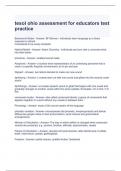Tesol practice questions - Study guides, Class notes & Summaries
Looking for the best study guides, study notes and summaries about Tesol practice questions? On this page you'll find 103 study documents about Tesol practice questions.
Page 2 out of 103 results
Sort by
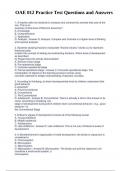
-
OAE 012 Practice Test Questions and Answers, OAE 13 Exam Review Questions and Answers, OAE Early Childhood Education Practice Test 2024 with 100%Correct Answers & OAE Tesol Test Exam 2024/2025 with 100%Verified Answers.
- Package deal • 4 items • 2024
-
- $30.49
- + learn more
OAE 012 Practice Test Questions and Answers, OAE 13 Exam Review Questions and Answers, OAE Early Childhood Education Practice Test 2024 with 100%Correct Answers & OAE Tesol Test Exam 2024/2025 with 100%Verified Answers.
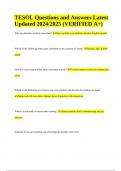
-
TESOL Exam Practice Questions With Correct Answers Latest Updated 2024/2025 (VERIFIED)
- Exam (elaborations) • 11 pages • 2024
- Available in package deal
-
- $15.99
- + learn more
TESOL Questions With Correct Answers Latest Updated 2024/2025 (VERIFIED) Which of the following body parts contribute to the creation of sound? tongue, lips, & hard palate How do vowel sounds differ from consonant sounds? Vowel sounds involve less obstruction of air Which of the following are reasons why your students should practice reading out loud? Improved self-correction, sharper focus & practice with intonation What is a downside of round robin reading? Some students find it embarras...
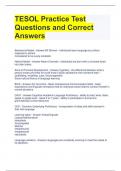
-
TESOL Practice Test Questions and Correct Answers
- Exam (elaborations) • 10 pages • 2023
-
Available in package deal
-
- $12.99
- + learn more
TESOL Practice Test Questions and Correct Answers Behaviorist Model - Answer-BF Skinner - individuals learn language as a direct response to stimuli. Considered to be overly simplistic Nativist Model - Answer-Noam Chomsky - individuals are born with a universal wired into their brains Zone of Proximal Development - Answer-Vygotsky - the difference between what a person knows and what he could know if given assistance from someone else -- scaffolding, modeling, cues, encouragement. So...
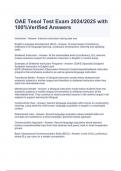
-
OAE Tesol Test Exam 2024/2025 with 100%Verified Answers, OAE Early Childhood Education Practice Test 2024 with 100%Correct Answers, OAE 13 Exam Review Questions and Answers & OAE 012 Practice Test Questions and Answers.
- Package deal • 4 items • 2024
-
- $30.49
- + learn more
OAE Tesol Test Exam 2024/2025 with 100%Verified Answers, OAE Early Childhood Education Practice Test 2024 with 100%Correct Answers, OAE 13 Exam Review Questions and Answers & OAE 012 Practice Test Questions and Answers.
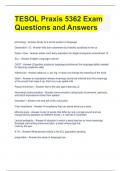
-
Bundle For TESOL Exam Questions with Correct Answers
- Package deal • 9 items • 2023
-
- $21.49
- + learn more
1 Exam (elaborations) TESOL Exam Questions with Correct Answers 2 Exam (elaborations) TESOL Praxis 5362 Exam Questions and Answers 3 Exam (elaborations) TESOL Quiz 1 Exam Questions with Correct Answers 4 Exam (elaborations) TESOL Practice Test Questions and Correct Answers 5 Exam (elaborations) TESOL Final Test Questions with Correct Answers 6
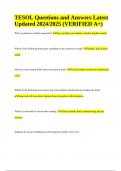
-
TESOL Questions and Answers Latest Updated 2024/2025 (VERIFIED A+)
- Exam (elaborations) • 11 pages • 2024
-
- $16.49
- + learn more
TESOL Questions and Answers Latest Updated 2024/2025 (VERIFIED A+) Which of the following body parts contribute to the creation of sound? tongue, lips, & hard palate How do vowel sounds differ from consonant sounds? Vowel sounds involve less obstruction of air Which of the following are reasons why your students should practice reading out loud? Improved self-correction, sharper focus & practice with intonation What is a downside of round robin reading? Some students find it embarrassing a...
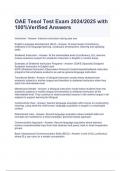
-
OAE Tesol Test Exam 2024/2025 with100%Verified Answers, OAE Early Childhood Education Practice Test 2024 with 100%Correct Answers, OAE 13 Exam Review Questions and Answers & OAE 012 Practice Test Questions and Answers.
- Package deal • 4 items • 2024
-
- $33.49
- + learn more
OAE Tesol Test Exam 2024/2025 with100%Verified Answers, OAE Early Childhood Education Practice Test 2024 with 100%Correct Answers, OAE 13 Exam Review Questions and Answers & OAE 012 Practice Test Questions and Answers.
tesol ohio assessment for educators test practice questions and answers
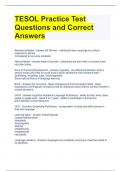
-
TESOL Practice Test Questions and Correct Answers
- Exam (elaborations) • 10 pages • 2023
-
Available in package deal
-
- $10.99
- + learn more
TESOL Practice Test Questions and Correct Answers Behaviorist Model - Answer-BF Skinner - individuals learn language as a direct response to stimuli. Considered to be overly simplistic Nativist Model - Answer-Noam Chomsky - individuals are born with a universal wired into their brains Zone of Proximal Development - Answer-Vygotsky - the difference between what a person knows and what he could know if given assistance from someone else -- scaffolding, modeling, cues, encouragement. S...
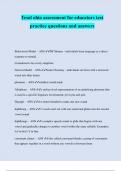
-
Tesol ohio assessment for educators test practice questions and answers
- Exam (elaborations) • 15 pages • 2023
- Available in package deal
-
- $12.49
- + learn more
Tesol ohio assessment for educators test practice questions and answers Behaviorist Model - ANS ️️ BF Skinner - individuals learn language as a direct response to stimuli. Considered to be overly simplistic Nativist Model - ANS ️️ Noam Chomsky - individuals are born with a universal wired into their brains phoneme - ANS ️️ smallest sound made Allophone - ANS ️️ a surface level representation of an underlying phoneme that is used in a specific linguistic environment; /p/ ...

How did he do that? By selling his study resources on Stuvia. Try it yourself! Discover all about earning on Stuvia



